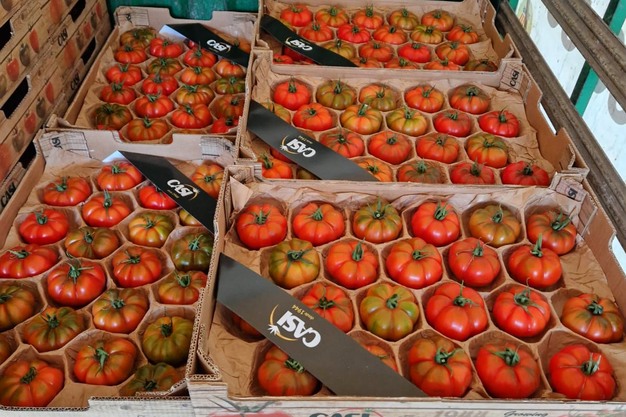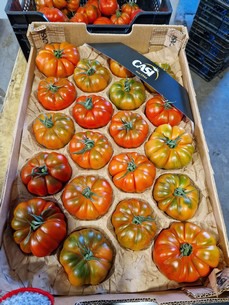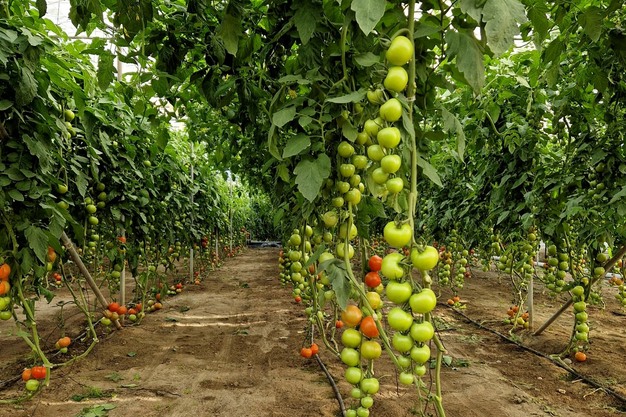At the outset of 2024, tomato prices experienced a downturn that is still being felt right now. "This year's tomato campaign kicked off in a somewhat atypical manner. At CASI, where we handle between 60 and 70% of some of the tomato varieties produced in the province of Almería, we decided to delay this campaign's transplanting due to the rugose virus situation, and the weather conditions also raised some concerns. The transplanting was delayed by about 7-10 days on average, which pushed back the start of the harvesting by 2-3 weeks compared to a normal campaign. This resulted in high prices and shortages, with no significant volumes becoming available until December," said Juan Jesús Lara, CEO of CASI.

"However, we cannot forget that we operate in a globalized market. Morocco and Turkey enjoyed favorable weather conditions in December and had excess production. This, together with the fact that our campaign is now in full swing, has pushed prices down," he says. "At CASI, we have both commodities and specialties, and we can definitely market specialties better because they are well-established, high-value varieties," says Juan Jesús.
 "We are not in an easy position right now, as this situation of excess production in the market has coincided with the protests in almost all European countries, including Spain, which has caused some delays in our logistics and generated some uncertainty in the market. And it's worth recalling that while we have suffered roadblocks, Morocco has been able to continue shipping its tomatoes by sea without any restrictions to France, as well as to the Netherlands and the UK."
"We are not in an easy position right now, as this situation of excess production in the market has coincided with the protests in almost all European countries, including Spain, which has caused some delays in our logistics and generated some uncertainty in the market. And it's worth recalling that while we have suffered roadblocks, Morocco has been able to continue shipping its tomatoes by sea without any restrictions to France, as well as to the Netherlands and the UK."
"But despite all this, and the fact that prices have not been comparable to those recorded in January last season, we have not experienced any problems, either in the supply or in sales, thanks to our productive stability, the service we provide, our quality, and our commitment to betting on products that no one else has," says Juan Jesús Lara. "It's also worth recalling that the campaign lasts until April, and we believe there is still time for the market to regulate itself. Morocco's excess production will be lacking at the end of its campaign, with its volumes usually starting to fall in February/March, and this year, Ramadan starts earlier, so they will also stop exporting earlier. As for Turkey, they won't be affecting us much because they are not working with the same varieties or exporting to the same markets. And although the Netherlands will start producing in high-tech greenhouses soon, we strongly believe that tomato prices could start recovering by the end of February."

"We must take into account that only 40% of the campaign has been completed, and that our plantations are doing very well. Also, what matters most in the end is the average profitability, so we'll have to wait a few months for a more accurate final balance."
"If they only put obstacles in our way, we won't be able to continue differentiating ourselves"
With 80 years of history and almost 2,000 tomato producers, CASI, the largest producer and distributor of tomatoes in Europe, wished to show its support for the protests of Spanish producers and to express its agreement with the sector's demands.
"From the very start, we have been standing behind the producers and associations like Coexphal, and we agree with the demands from this association requesting less bureaucracy and a solution to the issue of phytosanitary products and the unfair competition from other countries. It's incredible that there's never a parliamentarian or legislator consulting someone with responsibility in the sector or an association before making decisions that will fully affect them. To know what's going on in the fields, you have to be there first."
"An example of this is the digital field notebook. On average, CASI producers are around 50 years old and many of them are not digitally prepared for such a radical change, so we have had to create a specific department to provide support for the changes that are coming. This is the kind of issue that those making the rules are sadly not taking into account."
"A task that is already challenging, both financially and bureaucratically, should be made easier. Looking back at 80 years of history, CASI has managed to reinvent itself on numerous occasions, but if they only put obstacles in our way, we won't be able to continue differentiating ourselves. And the same will apply to other companies in the sector."
 For more information:
For more information:
CASI
Carretera Níjar, la Cañada, km8
El Alquián 04130, Almería. Spain
Tel.: +34 950 626 141
info@casi.es
www.casi.es
